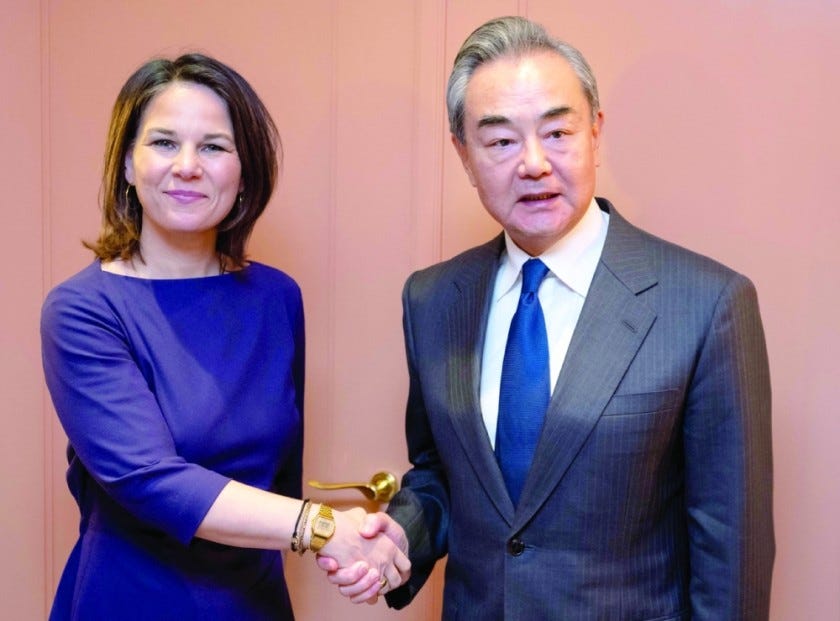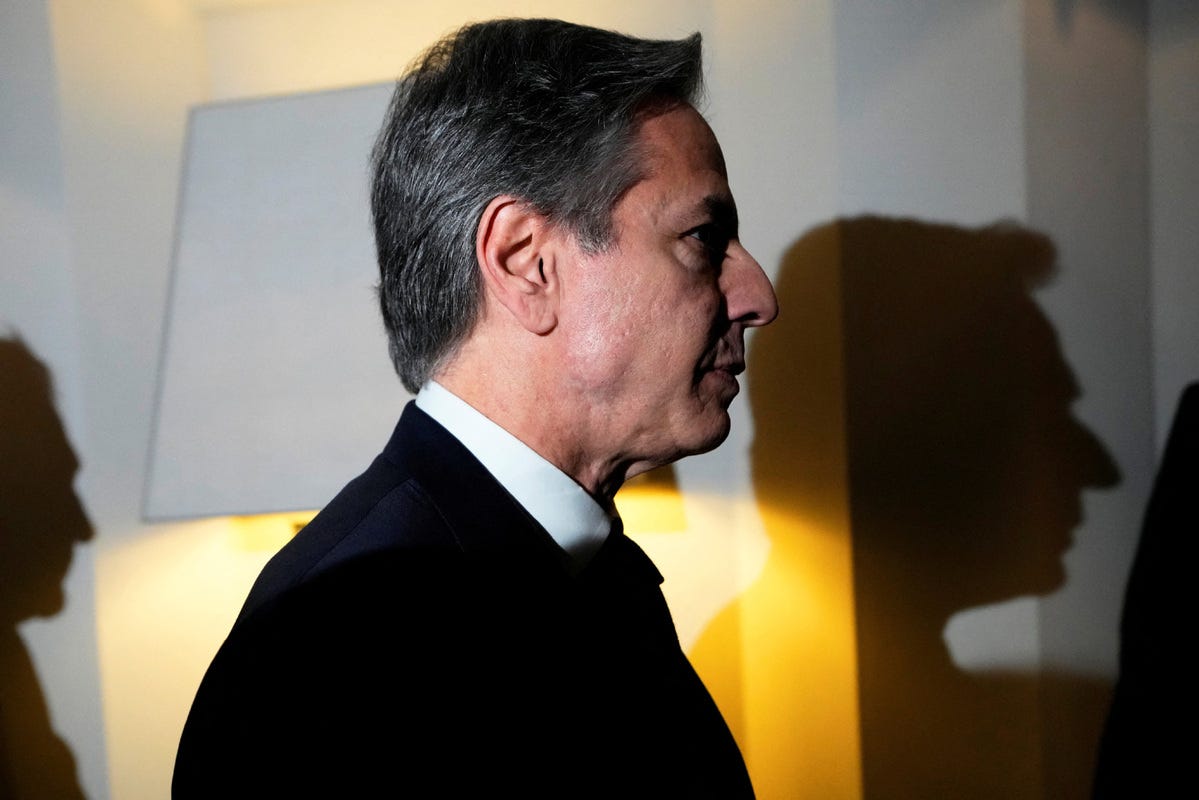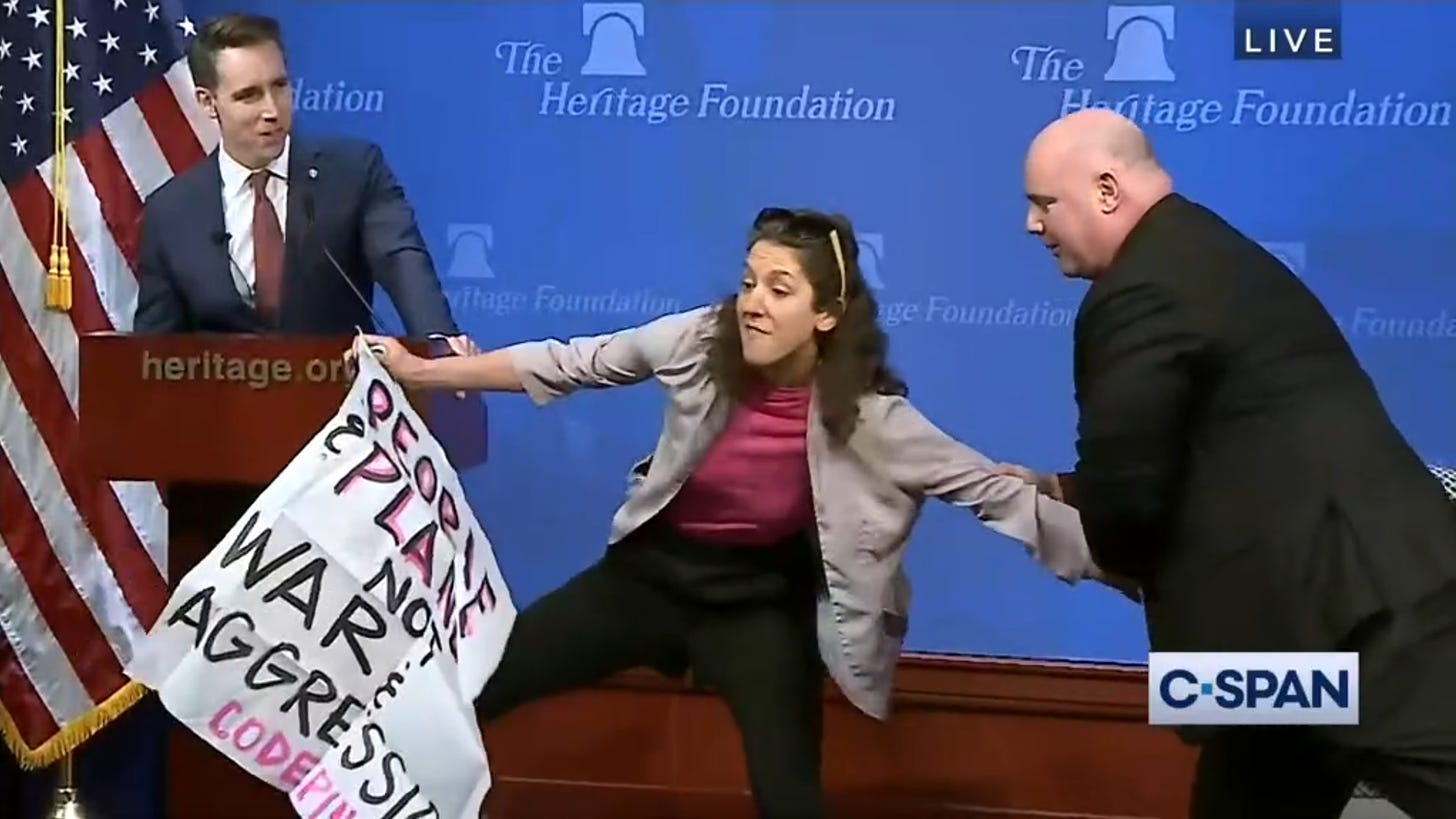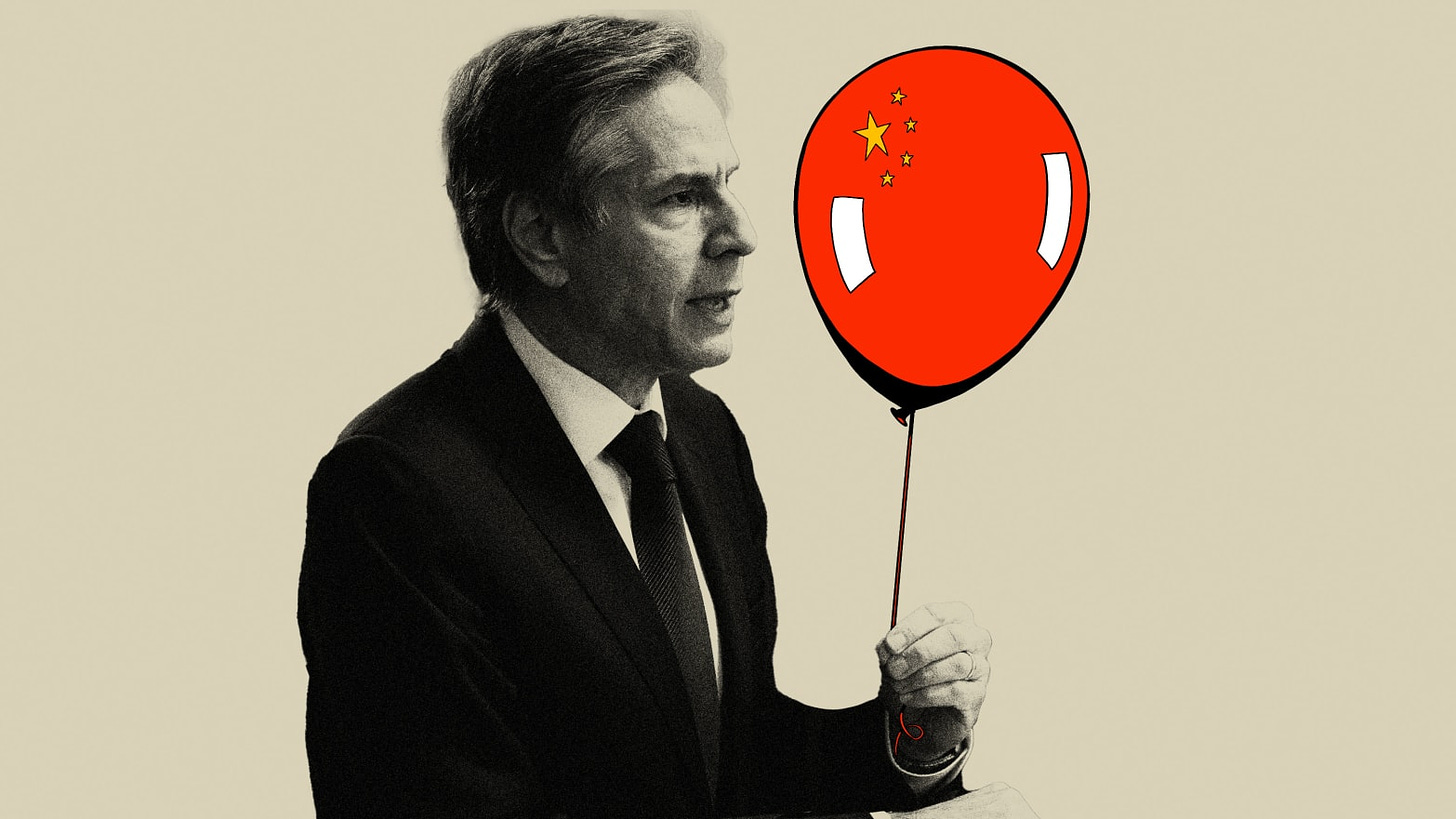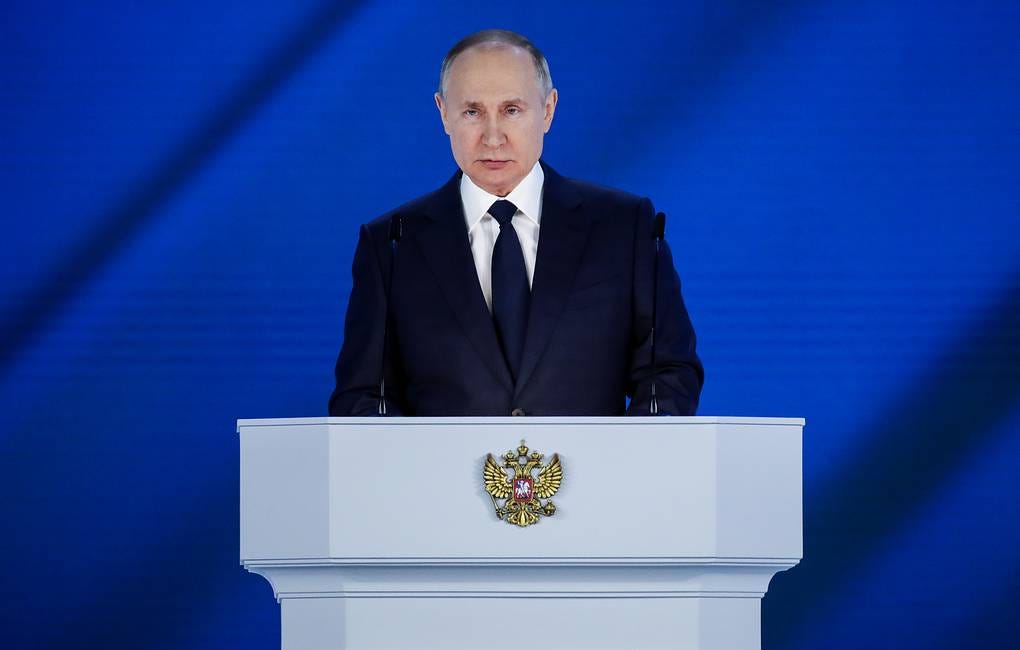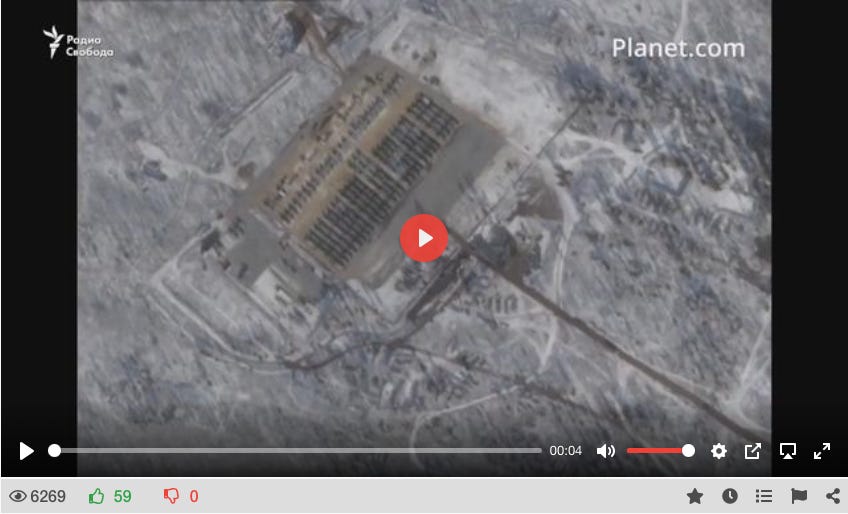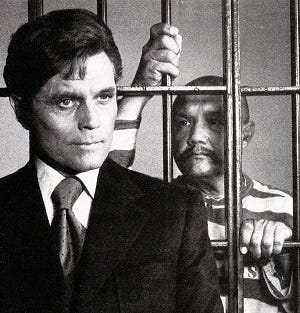The Peace Balloon
China talks peace, US warns China, Scholz; China is right, Russia advances, Macron; "no regime change",
UPDATE: While Secretary Blinken got his much sought after meeting with China’s top diplomat Wang Yi in Munich, he used it to seek a balloon apology and “warn” China over Ukraine.
Wang Yi’s speech in Munich was for peace. However, “Peace in our time” is not Blinken’s objective, rather it is to create lebensraum for NATO.
The United States is trying to sideline - or obscure - China’s peace efforts by putting a ballon on TV and warning everyone that China “might” help Russia. These are classic misdirection tactics to obscure US failures in Ukraine, where Russia clearly has the upper hand and has made strong advances, and its rapid militarisation of the Pacific.
The entire Global South has called for a rapid de-escalation and back China’s peace initiative. The US is not leading the world, but rather a fragile coalition of NATO states that are in or very near recession and see the war as a means to distract their populations from rapidly reduced standards of living caused by poor governance and inflationary wars.
Meanwhile protected by two oceans, the US is promoting conflict and the spilling of blood. Is it possible that Korea, Vietnam, Iraq and Afghanistan can be forgotten so easily. The Ukraine is another US effort to extend the life of its declining empire by depleting Europe and Russia so it can intensify belligerence toward China.
China talks peace, but are the EU and US listening?
In a major speech, China’s newly promoted foreign policy chief Wang Yi broke the news at the Munich Security Conference on Saturday that President Xi Jinping would soon present a “peace proposal” to resolve the conflict between Moscow and Kyiv. He appealed specifically to the European leaders to get on board the peace train and shun the Americans.
"I suggest that everybody starts to think calmly, especially friends in Europe, about what kind of efforts we can make to stop this war […] some forces that seemingly don't want negotiations to succeed, or for the war to end soon,"
In contrast, Wang launched a vociferous attack on “weak” Washington’s “near-hysterical” reaction to Chinese balloons over U.S. airspace, portraying the country as warmongering.
“Some forces might not want to see peace talks to materialize […] they don’t care about the life and death of Ukrainians, [nor] the harms on Europe. They might have strategic goals larger than Ukraine itself. This warfare must not continue.”
China will set out its position on settling the Ukraine crisis in a document that will state all countries' territorial integrity must be respected, Wang said.
China has "neither stood by idly nor thrown fuel on the fire" regarding the crisis in Ukraine, and continues to call for peace and dialogue”
Asked to reassure the audience that military escalation was not imminent over the Taiwan Strait, Wang said Taiwan "independence forces" are incompatible with peace.
"If we want to maintain peace across the Taiwan Strait, we must resolutely oppose Taiwan independence, and we must resolutely maintain the one-China policy."
Prejudice and ignorance of Washington result in hysterical approaches to China
That a meeting between Wang Yi, director of the Office of the Foreign Affairs Commission of the Communist Party of China Central Committee, and United States Secretary of State Antony Blinken took place on the sidelines of the Munich Security Conference, after the latter called off a trip to Beijing at the last minute, shows the significance both sides attach to communication at a trying moment for bilateral ties.
Despite this, their meeting only served to expose how difficult it is for the two sides to have any meaningful discussions because of the ignorance and prejudice of the US regarding China, which have reached an almost absurd degree.
It is that ignorance and prejudice that prompted the US' overreaction to the Chinese meteorological balloon that was inadvertently blown into US airspace. It is that ignorance and prejudice that has fuelled the US' paranoia about China's development and the US' increasingly hysterical response, which consists of an ideological war, chip war, trade war, the striving for economic decoupling, military coercion, geopolitical containment and international isolation.
There is no doubt that Wang's advice that the US should "change course, acknowledge and repair the damage that its excessive use of force (in shooting down the balloon) has caused to China-US relations" has fallen on deaf ears again. Unless the US develops a rational view of China, and of itself, as being but one country among many, the exchanges between the two sides may continue to be wasted opportunities.
Read full article here.
US neuralgia haunt GOP Sen. Hawley’s imaginings
As the one-year anniversary of Russia’s invasion of Ukraine approaches, a leading conservative Republican voice in Congress said it was time to let European allies take the lead in the fight to allow the U.S. military to focus its attention on China. A nationalist U.S. foreign policy would concentrate on the Pacific to counter Beijing’s economic prowess and increasingly aggressive foreign policy. Mr. Hawley said China is on the march, posing a major challenge to U.S. allies and interests in the region.
“We do have an undersea advantage, that’s true. But we only have so many submarines, we only have so many weapons to fire from them, and we’ve only got so many places to reload or refit them […] We are at an inflection point. If China invades Taiwan, they would prevail”
A year into Russia’s war with Ukraine, a new poll says 26% say the U.S. should play a “major” role in the conflict between Russia and Ukraine, while 49% said the U.S. has a “minor” role in the war. Almost a quarter of the public believes the U.S. shouldn’t have a role at all.
“Democrats and Republicans alike are increasingly likely to prioritise limiting damage to the U.S. economy over effective sanctions”
Mr. Hawley said the Biden administration should stop writing what he called “blank checks” to Ukraine in the face of the need to build up forces in Asia. The U.S. military also should scale back in Europe and open up the weapons pipeline to Taiwan, similar to what it has done in Ukraine.
“Ukraine or China. We can’t do both at the same time,” he said. The European Union “must take the responsibility for Europe.”
A war over Taiwan could send the U.S. into a deep recession with no clear way out since huge swathes of our economy run on Taiwanese semiconductors. “We will lose more jobs. Our industry will suffer and the economic consequences are just the start,” Sen. Hawley said.
“Imagine a world where Chinese warships could patrol, let’s say, Hawaii’s waters and Chinese submarines could stalk the California coastline […] Imagine a world where the People’s Liberation Army has military bases in Central and South America. Imagine a world where Chinese forces operate freely in the Gulf of Mexico and the Atlantic Ocean.”
Read more here.
Blinken warns China's Wang Yi against aiding Russia in Ukraine
The top diplomats of the two superpowers met at an undisclosed location on the sidelines of a global security conference in Munich. Earlier, speaking at a panel at the conference, Wang reiterated a call for dialogue and suggested European countries "think calmly" about how to end the war. He also said there were "some forces that seemingly don't want negotiations to succeed, or for the war to end soon.”
U.S. Secretary of State Antony Blinken warned Wang Yi of consequences should China provide material support to Russia's invasion of Ukraine, saying in an interview after the two met that Washington was concerned Beijing was considering supplying weapons to Moscow. In the interview with NBC, Blinken said Wang did not apologise for the balloon's flight. "I told him quite simply that that was unacceptable and can never happen again," Blinken said, referring to the balloon's violation of U.S. air space.
Wang Yi accused the United States of violating international norms with "hysterical" behaviour by shooting down the balloon. "To have dispatched an advanced fighter jet to shoot down a balloon with a missile, such behavior is unbelievable, almost hysterical," Wang said. "There are so many balloons all over the world, and various countries have them. So, is the United States going to shoot all of them down?" he said.
Read full article here.
Putin to focus on special military operation in his Address to Federal Assembly
Russian President will deliver his State of the Nation Address to the Federal Assembly on February 21. In his State of the Nation Address to the Federal Assembly, Russian President Vladimir Putin will pay attention to topics related to the special military operation, Russian presidential spokesman Dmitry Peskov said in an interview with Rossiya 1 TV channel.
"Our lives are now centered around the subject of the special military operation. The military operation affects our entire lives one way or another, as well as life on the continent. So, we should anticipate the president to pay particular attention to it," Peskov said.
Read more here.
Notes from the Ukraine front
Since we’re getting so close to approaching the nail-biting period of February 21 - 24 that so many are anticipating, I figured it’ll be good to compile all the recent, top developments regarding the potential for a new ‘major’ Russian offensive. Some of them have already been mentioned in a previous update, but we’ll cite them again to centralize all relevant materials.
Note, the specific confirmation of something we predicted here in one of the recent reports, which is that the offensive is likely to kick off, not all at once but in several stages in order to maximise confusion, allow a little lead time for AFU to frantically send reserves to one direction to caulk the flow, only for a completely different direction to massively kick off into un-reinforced territory.
Read full situation report here.
Watch video here.
Beyond the balloon: the US-China spy game
Chinese state intelligence-gathering has grown in ambition and scale, leaving Washington struggling to catch up. The appearance of what the US calls a spy balloon with intelligence-collecting gear over North American soil exacerbated concerns that China is stepping up surveillance activity in near space. In November, the Pentagon said China had more than 260 intelligence-related satellites, a doubling from 2018.
In Beijing’s Military Museum of the Chinese People’s Revolution, the prize exhibit is the pockmarked wreckage of an aircraft that became an icon of the cold war — an American U-2 spy plane. The exhibit is a reconstruction made from the remains of four of the five CIA U-2s shot down over China from 1962. When the first U-2 came down, Chairman Mao Zedong led the celebrations with a ceremony at the Great Hall of the People, according to a museum video.
“From the Chinese Communist rise to power in 1949 to Richard Nixon’s trip to China in 1972, we were extremely aggressive […] the CIA flew U-2s over the Lop Nor nuclear test site in south-east Xinjiang as China was developing its nascent nuclear programme (Dennis Wilder, ex CIA China desk)
After the Tiananmen Square incident in 1989, the CIA reverted to aggressively spying on China, including continuing the reconnaissance flights up the Chinese coast and other parts of the South China Sea. A wake-up call for the US about China’s capabilities came in the two years before Xi Jinping became president in 2012.
Over that period, the CIA noticed that something was badly awry with its China operations. The MSS was rounding up CIA assets — the spies it recruits — and imprisoning or executing them. There has since been lots of debate inside the CIA about how it occurred. The best explanation for how China took down the spy network was that it discovered how CIA operatives communicated with spies using “covcom”, or covert communications.
A former senior intelligence official says there had been a “major security screwup” that led to the decimation of the spy network. “It was the compromise of the covcom systems that gave the Chinese the leads.”
The covcom breach came as China was ramping up its technical counter-intelligence capabilities — everything from surveillance cameras and computers that detect licence plates, to the tracing of “digital dust” created by smartphones and internet use.
“The Chinese technical surveillance far exceeded what we thought they were capable of, the combination of this capability with Lee’s information and the breach of the covcom was a “perfect storm”. The CIA declined to comment on whether China had penetrated covcom systems.
As Xi Jinping came to power, MSS underwent a shift. Chris Johnson, a former top CIA China analyst, says it had for years focused on the “five poisons” — Tibetan and Taiwanese separatists, democracy activists, Falun Gong members and Uyghurs — but that changed under the new general secretary and president. He pushed the MSS to step up their game overseas, and to start collecting more in the manner of CIA or MI6.
China complains that they are constantly being spied on by the US. Zhou Bo, a retired senior Chinese military officer, recently accused the Pentagon of conducting “endless” reconnaissance flights near the Chinese coast and US navy warships of carrying out “freedom of navigation operations” in the area. The US stresses back, however, that its operations are conducted in international airspace and waters.
The US has struggled to rebuild the spy network that broke up in the early 2010s. Over the past decade, the dramatic expansion of surveillance in China has made it more difficult for the CIA to recruit spies.
Read full article here.




